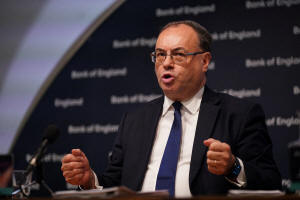BoE says Truss plans could slow inflation, too soon to talk about rates
 Send a link to a friend
Send a link to a friend
[September 07, 2022] By
David Milliken and Andy Bruce
LONDON (Reuters) - Britain's surging
inflation could slow thanks to plans by new Prime Minister Liz Truss to
help households and businesses cope with rocketing energy costs, but it
was too soon to say what that means for interest rates, the BoE's chief
economist said.
The central bank has picked up its pace of increases in borrowing costs
in a bid to limit the damage for the world's fifth-biggest economy from
a leap in inflation above 10%, even as it expects a recession to start
later this year.
The BoE forecast in August that inflation would exceed 13%, and some
economists say it will go higher than that if gas prices - pushed up by
Russia's invasion of Ukraine - stay high.
"One of the things that does seem to be under consideration ... is a
change to the relationship between gas prices and retail gas prices in a
direction that will lower headline inflation, relative to what we were
forecasting," Huw Pill told lawmakers.
While the subsidies for households could add to demand and create more
inflation pressure, "net-net on the implications for headline inflation
in the short term, I would expect that to see a decline," Pill said.
Truss moved into Downing Street on Tuesday, promising to help Britain
through its gas price shock, and she is expected to announce details of
her plans on Thursday.
Pill said the implications for monetary policy from the government's
plans remained unclear.
"I think there's just too much uncertainty to have a strong view right
now, given the lack of details."
But he added that the BoE would ensure that government spending did not
generate inflation.
"Fiscal policies will have their own dynamics, as will other shocks to
the economy, and we as the central bank, our role is, our mandate is,
our remit is to return inflation to the target," Pill said.
Governor Andrew Bailey, also speaking to parliament's Treasury
Committee, welcomed Truss' impending announcement of her plans this
week.
[to top of second column] |

Governor of the Bank of England, Andrew
Bailey, speaks during the Bank of England's financial stability
report news conference, at the Bank of England, London August 4,
2022. Yui Mok/Pool via REUTERS
"It's not for us to comment on what fiscal policy will be and we will wait and
see what it is ... but I do very much welcome the fact that there will be, as I
understand it, announcements this week because I think that will help to, in a
sense, frame policy and that's important," he said.
"It's important that there is a clear way forward on policy ... That will be
important for markets to understand what is going to happen."
British government bond prices have slumped on worries about the scale of
borrowing needed to fund Truss' cost-of-living support plans and the tax cuts
she has promised, pushing 10-year British government bond yields to their
highest since 2011.
Deutsche Bank said on Wednesday that the energy price support and tax cuts
planned by Truss could cost almost 200 billion pounds, about half Britain's
historic pandemic spending push.
Investors are pricing in the BoE raising the Bank Rate to almost 4.5% by the
middle of 2023, up from 1.75% now, although most economists have said they think
it will peak at a lower level, given the likelihood of a recession starting
later this year.
Rate futures were putting a 54% chance of a three-quarters-of-a-percentage point
increase in the Bank Rate at the BoE's next scheduled policy announcement on
Sept. 15. Earlier on Wednesday, that probability stood at nearly 70%.
The last time the central bank raised rates by at least 75 basis points was in
1989.
(Reporting by David Milliken and Andy Bruce; Writing by William Schomberg;
Editing by William James and Bernadette Baum)
[© 2022 Thomson Reuters. All rights
reserved.]This material may not be published,
broadcast, rewritten or redistributed.
Thompson Reuters is solely responsible for this content. |